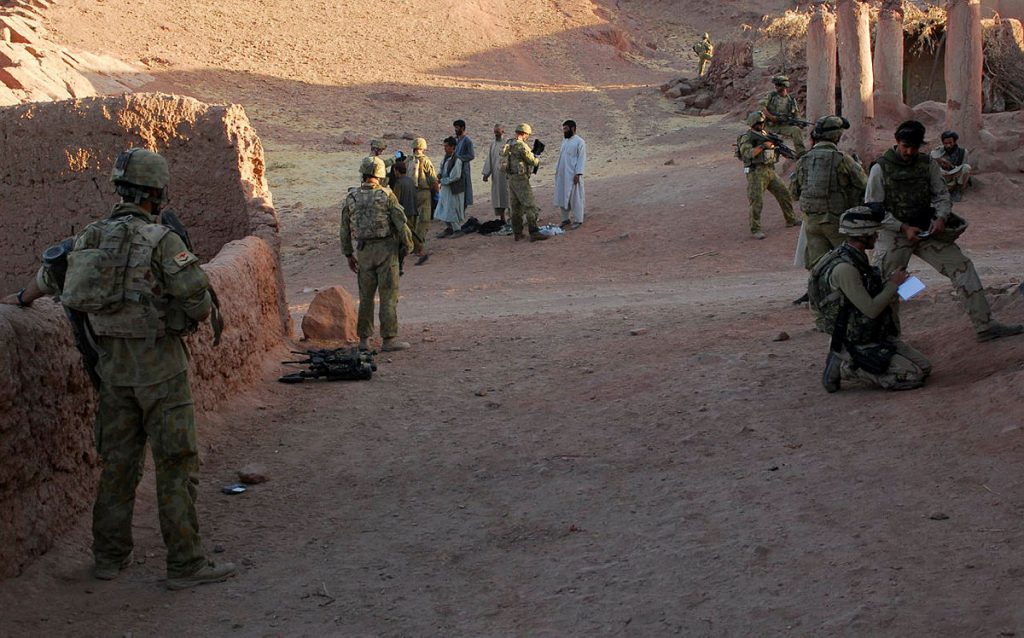Granting visas to Australia’s Afghan allies would speak volumes about us
Posted By John McCarthy on July 16, 2021 @ 11:00

The current debate in Australia about visas for Afghans who worked with Australian forces poses questions about the sort of people we are.
Australia has historically veered between kindness to strangers and insularity tinged with meanness of spirit.
This is the country which, until half a century ago, confined immigration almost wholly to whites; which has a pathological fear of the arrival of boats crowded with refugees; which declined in 1975 to evacuate local employees from its Phnom Penh and Saigon embassies; and which with Covid-19 has been more obsessive than any nation about control of its borders—even those within Australia.
It is also the country that opened up to displaced persons after World War II; that was one of four countries that took the bulk of refugees from Vietnam in the years after 1975; that after the Tiananmen Square massacre in 1989 allowed 42,000 Chinese to remain in Australia; and that gave Indonesia $1 billion when a tsunami bludgeoned it in 2004.
The government is taking flak for its rigidity in approaching the Afghan visa issue.
To be fair, current circumstances in Afghanistan are not, as alleged by some, on par with the collapse of South Vietnam in 1975.
Over recent years, we have taken a number of our former Afghan employees and other Afghans threatened by the Taliban. And, according to Foreign Minister Marise Payne, we have taken 230 former employees in the past month.
Besides, it is not yet a given that all or most of Afghanistan will fall to the Taliban.
But it soon might.
An aspect of the Vietnam analogy that is truly worrying is that when the North Vietnamese Army began its offensive in the Central Highlands of South Vietnam on 10 March 1975, few understood the degree to which panic is infectious [1] or anticipated the speed with which South Vietnamese morale would collapse.
The North Vietnamese Army captured Saigon on 30 April.
An aspect of ministerial and official comments on the Afghan visa issue is the propensity to take refuge in the bureaucratic niceties of immigration. These include whether an employee identified with Australia worked directly for us or for a subcontractor, and the importance of ‘strict’ health and character checks.
As former prime minister John Howard suggested last week, this is not the time for legalisms.
There are going to be people otherwise eligible for entry who may be sick. We can treat them. As far as ‘character’ is concerned, war zones produce a motley crew. Give them the benefit of the doubt. And police checks in Afghanistan? Well really!
Some of the best examples of statecraft are decisions made by leaders comfortable in their skins who are prepared to go beyond conventional policy responses or bureaucratic diktat. Bob Hawke showed this capacity after Tiananmen Square. So did Howard after the tsunami.
Moreover, when a prime minister puts political weight behind an issue, things can get done very quickly.
In 1999, Howard decided to accord temporary refuge to groups of thousands of both East Timorese and Kosovars. [2] The decisions were implemented in two or three weeks.
There are also broader issues involved here. The Americans went into Afghanistan—with Australia and NATO behind them—for a plethora of reasons emerging from the terrorist attacks of 11 September 2001. Part of these had to do with American and Western security and the need for a visible signal that the US was not to be challenged—above all on its own turf.
Another argument was about values. Putting aside the usual hype about ‘freedom’ that accompanies Western military ventures, the Americans and the rest of us were genuine in advocating the merits of our ideals and our systems.
These perspectives took on added salience not only with developments in the Middle East and western Asia, but also against a background of authoritarianism in Russia, a shift to the right in parts of Europe, and an increasingly aggressive China.
If indeed the outcome in Afghanistan is as bad as the runes suggest, the adverse consequences for the reputation of the US, NATO and the West will be severe. The photographs of an abandoned Bagram airbase [3] already say a lot. If Taliban flags again fly over Kabul, they will testify to another lost American war [4].
Respect for America will thus be vulnerable to the sort of erosion that occurred for the decade after Vietnam. More recently, that respect suffered body blows during the reign of Donald Trump. Western authority as a whole will diminish with it.
These are much larger issues than the question of whether Australia should be big-hearted towards our Afghan friends or should hide behind the arcane ramparts of the Department of Home Affairs.
But this choice is far from irrelevant to bigger things. We are a part of alliances and other international and regional groupings claiming a set of values that further the principles of liberalism. Against the backdrop of an Afghanistan in which the West is seen to have failed, we must practise the values that we preach if we are to retain an element of credibility.
It is time to be generous again—and quickly.
Article printed from The Strategist: https://www.aspistrategist.org.au
URL to article: https://www.aspistrategist.org.au/granting-visas-to-australias-afghan-allies-would-speak-volumes-about-us/
URLs in this post:
[1] the degree to which panic is infectious: https://www.afr.com/world/middle-east/afghans-look-for-ways-out-as-allied-forces-exit-20210704-p586r2
[2] East Timorese and Kosovars.: https://www.afr.com/link/follow-20180101-p57nc7
[3] abandoned Bagram airbase: https://www.abc.net.au/news/2021-07-09/us-military-leave-bagram-air-base-afghanistan-equipment-handover/100277452
[4] testify to another lost American war: https://www.afr.com/policy/foreign-affairs/kabul-spy-station-exit-an-admission-of-defeat-20210531-p57wtq
Click here to print.